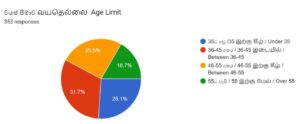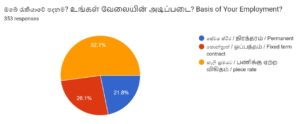
Press release- November 27, 2022
The plight of Professional Journalists in Sri Lanka revealed
The survey reveals that Journalism is the only profession in Sri Lanka where the majority of employees are denied their basic professional rights.
A report was released on the professional status of journalists in Sri Lanka and the challenges they face. The report was compiled by the Federation of Media Employees Trade Unions, FMETU through an all-island survey of journalists conducted during the latter part of 2022, under the IFJ-Union to Union (UTU) Global Union program, with the guidance and support of the International Federation of Journalists (IFJ),
The survey was tailored to identify key challenges faced by journalists in Sri Lanka. An online Google application form was used to collect the data of the journalists. The main expectation of this research was to gather information on each individual journalist. Areas covered include training, adherence to local labour regulations, facilities, and work-related pressure. A representative sample of 340 mainstream and regional Sinhala, Tamil, and English language media professionals participated in the survey and furnished data that was used for the preparation of the report covering journalists from all districts of Sri Lanka.
To illustrate further the findings of the survey, young journalists were provided training on digital media and supported to produce videos on the professional status of Journalists in Sri Lanka. Using the skills they developed through the training, 15 videos focusing on the media industry and the professional issues of journalists were produced by young journalists. The videos were produced in Sinhala, Tamil, and English.
The complete survey report, 15 videos, and details about the journalists who participated in the survey have been published on the FMETU website https://fmetu.org/?page_id=9839.
The survey brought to light some salient facts related to journalists and the media industry. According to the survey, it has been revealed that 59% of the journalists working in Sri Lankan media organizations do not receive their salaries on a specified date. It has been revealed that 91% of journalists do not receive any special allowance. 92% of the journalists who participated have maintained that the current remuneration they receive is not sufficient in relation to their professional credentials and work carried out as professional journalists.
 Currently, 26% of the journalists working in the media industry are under the age of 35. About 31% are between the ages of 35 and 45, and 25% are between the ages of 45 and 55. 16% of journalists are over the age of 55 years.
Currently, 26% of the journalists working in the media industry are under the age of 35. About 31% are between the ages of 35 and 45, and 25% are between the ages of 45 and 55. 16% of journalists are over the age of 55 years.
 Most of these journalists have got through the GCE Advanced level examination. In terms of percentage, it is 36%. Also, 19% have studied up to GCE O Level and 28% are Diploma holders. 9% of the journalists have university degrees.
Most of these journalists have got through the GCE Advanced level examination. In terms of percentage, it is 36%. Also, 19% have studied up to GCE O Level and 28% are Diploma holders. 9% of the journalists have university degrees.
According to this report, the percentage of journalists in different languages are as follows: 65.2%, Sinhala language media, 34.3%, Tamil media, and 10.5%, English media
Out of these, 53.3% work in print media, 47.9% in television, 27.8% in radio, and 27.5% in digital media. It is noteworthy that 90% of them are full-time media professionals. In addition, this survey has revealed that 18% of them have not received any formal training in journalism.
 1% of these journalists are employed on a permanent basis. Out of these, only, 14% of them have prospects of a promotion scheme. About 52% of journalists are employed on a piece-rate basis and another 26% are employed on a contract basis. Moreover, it has been confirmed that about 86% of journalists have no promotional prospects.
1% of these journalists are employed on a permanent basis. Out of these, only, 14% of them have prospects of a promotion scheme. About 52% of journalists are employed on a piece-rate basis and another 26% are employed on a contract basis. Moreover, it has been confirmed that about 86% of journalists have no promotional prospects.
This survey has also revealed more than 80% of journalists who serve print, electronic, and digital media institutions are not officially entitled to annual salary increments, benefits of the Employees’ Provident Fund, or the Employees’ Trust Fund, service gratuities, and bonuses that are enjoyed by employees in most other sectors.
of the Employees’ Provident Fund, or the Employees’ Trust Fund, service gratuities, and bonuses that are enjoyed by employees in most other sectors.
According to this report, 66.8 % of journalists have received appointment letters from their employers. There are 31.2% of journalists without appointment letters. It has been found out that
journalists have received appointment letters from their employers. There are 31.2% of journalists without appointment letters. It has been found out that the letter of renewal of service is considered by them to be the letter of appointment. 78.2% of the journalists have a media identification card and 21.8% do not have an identification card.
the letter of renewal of service is considered by them to be the letter of appointment. 78.2% of the journalists have a media identification card and 21.8% do not have an identification card.
About 68% stated that whilst working under such low conditions, there have been numerous instances where they have suffered professionally. 77% of journalists stated that they do not have adequate security while pursuing their media careers. 16.4% of the victims of violence are based on gender.
Under such a situation, 98% of them are of the opinion that they should organize themselves in order to improve their working conditions. Also, 95% have accepted that national and international support is needed for them to get better working conditions.
188 journalists involved in the print media participated in this survey, with 53.3%. The percentage of journalists who have participated from the television media is 47.9%, That is, 169, 98 radio Journalists, and 97 digital journalists. In terms of percentage, it is 27.8% and 27.5% respectively.
The survey report explains that among the professions in Sri Lanka, the media profession is the only profession where the vast majority of employees have been denied their basic professional rights.
This survey report makes it clear that the label of the fourth estate of the country, the watchdog of the nation, etc are mere terms and do not apply in reality to Sri Lankan Journalists.
The FMETU acknowledges with gratitude the young journalists, women journalists, and media colleagues all over the country, who supported this exercise by providing information and producing videos.
FMETU also thanks those who supported the implementation of the IFJ-Union to Union (UTU) Global Union program and the International Federation of Journalists (IFJ) which has continued to provide FMETU and Sri Lankan media with invaluable guidance and help.

Dharmasisr Lankapeli
General Secretary
on behalf of The Executive committee.
077 364 1111

